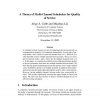Free Online Productivity Tools
i2Speak
i2Symbol
i2OCR
iTex2Img
iWeb2Print
iWeb2Shot
i2Type
iPdf2Split
iPdf2Merge
i2Bopomofo
i2Arabic
i2Style
i2Image
i2PDF
iLatex2Rtf
Sci2ools
109
click to vote
JHSN
2002
2002
A theory of multi-channel schedulers for quality of service
A computer network consists of a set of computing nodes interconnected via communication channels. It is commonly assumed that, for each pair of network nodes u and v, there is at most one channel from u to v. However, it is often desirable to have multiple channels between nodes. That is, for every pair of network nodes u and v, there may be multiple channels from u to v. In this paper, we consider the problem of providing deterministic quality of service guarantees when there are multiple channels between nodes. We show that any packet scheduling protocol that operates over a single channel can be modified to operate over multiple channels. In addition, this transformation increases the packet delay through the node by only a small amount. However, having multiple channels between nodes may cause packet reorder. This reorder significantly increases the upper bound on end-to-end delay. We show how this increase in delay is avoided through the use of efficient sorting techniques.
Related Content
| Added | 22 Dec 2010 |
| Updated | 22 Dec 2010 |
| Type | Journal |
| Year | 2002 |
| Where | JHSN |
| Authors | Jorge Arturo Cobb, Miaohua Lin |
Comments (0)

